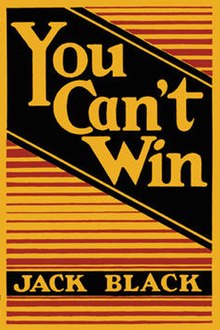You Can't Win (book)

First edition cover
|
|
| Author | Jack Black |
|---|---|
| Published | 1926 |
| Publisher | Macmillan |
You Can't Win is an autobiography by burglar and hobo Jack Black, written in the early to mid-1920s and first published in 1926. It describes Black's life on the road, in prison and his various criminal capers in the American and Canadian west from the late 1880s to early 20th century. The book was a major influence upon William S. Burroughs and other Beat writers. It was made into a film in 2015.
The book tells of Black's experiences in the hobo underworld, freight-hopping around the western United States and Canada, with the majority of incidents taking place from the late 1880s to around 1910. He tells of becoming a thief, burglar, and member of the yegg (safe-cracking) subculture, exploring the topics of crime, criminal justice, vice, addictions, penology, and human folly from various viewpoints, from observer to consumer to supplier, and from victim to perpetrator.
"You Can't Win" originally appeared in serial format in the San Francisco Call-Bulletin under the editorship of Fremont Older. It was so popular that it was reissued in book format by MacMillan and became a best-seller. It has since been translated into Russian, Swedish and French, among other languages.
After the book's publication, Black spent several years lecturing at women’s clubs and lived in New York. Black spent his summers in a cabin on Freemont Older's property in California, next to a pool. When MacMillan asked Black to write another book, he was too weak even to swim, according to Mrs. Fremont Older. He didn't write another book.
The main criminal activity of Black's life and of the book is thievery, which leads to discussions of various technical aspects of the thief's "trade", including casing of prospects (surveillance of targets), safe-cracking, fencing of stolen goods, the disposal of evidence, maintaining aliases and avoiding attention or traceability, the social networks of criminals, the experiences of being arrested, questioned, and tried, and the experience of doing time in jails and prisons.
The vices and addictions Black discusses include alcoholism, abuse of opium (hop), gambling, prostitution, and stealing. In his own telling, Black does not seem to have an especial weakness for addictions (for example, he did not become alcoholic himself), but he does describe the addictive allure that gambling and opium held for him in various stages of his life. He expresses an opinion that drug addiction is more psychological than physical; nevertheless, he also admits that breaking himself of a daily opium habit was the toughest battle of his life.
...
Wikipedia
